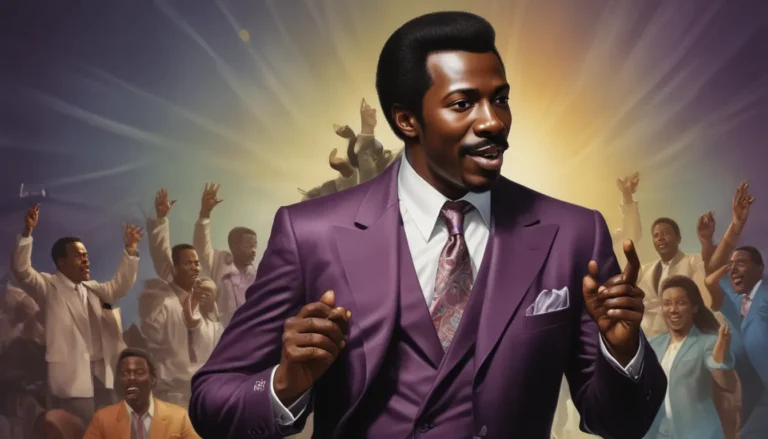The images in our articles may not match the content exactly. They are used to grab your attention, not to show the exact details in the text. The images complement the text but do not replace it.
Are you intrigued by historical figures who have left a lasting impact on society? If so, the life of Thomas More, also known as Saint Thomas More, may captivate your interest. Born in London in 1478, More was a multifaceted individual, excelling in fields such as law, philosophy, literature, and statesmanship. While he is best known for his seminal work “Utopia,” there are many lesser-known facts about Thomas More that shed light on his remarkable life and legacy. In this article, we will delve into eight mind-blowing facts about this influential figure, offering a deeper insight into his contributions and unwavering principles that continue to inspire generations.
Key Takeaways:
- Thomas More, a close friend of King Henry VIII, was executed for opposing the king’s divorce and later canonized as a saint for his steadfast faith.
- More’s work “Utopia” introduced the concept of an ideal society, leaving a lasting impact on European thought and sparking discussions on royal power and religious freedom.
A Friend of Kings and a Defender of Principles
Thomas More’s relationship with King Henry VIII was marked by both admiration and conflict. Despite being appointed as the King’s Chancellor and earning his respect for his intellect, More’s unwavering dedication to his principles led to a strained friendship. His refusal to endorse Henry’s divorce and break from the Catholic Church ultimately resulted in More’s tragic execution in 1535.
Delving into “Utopia”
“Utopia,” More’s most famous work published in 1516, offers a glimpse into an imaginary island society characterized by communal living, equality, and religious tolerance. The term “utopia,” coined by More himself, has since become synonymous with the concept of an ideal society, sparking discussions on societal norms and aspirations.
The Courageous Stand Against Royal Authority
Thomas More’s steadfast commitment to his beliefs is exemplified by his refusal to acknowledge Henry VIII as the Head of the Church of England and his vocal opposition to the king’s divorce. Despite facing the threat of treason and subsequent execution, More remained resolute in defending his faith and conscience.
A Legacy of Wit and Wisdom
Beyond his political and philosophical endeavors, Thomas More was renowned for his quick wit and a sharp sense of humor. His ability to navigate complex debates with humor and intellect cemented his reputation as a formidable thinker and communicator.
The Impact of a Martyr’s Resolve
Thomas More’s execution reverberated throughout Europe, prompting contemplation on the boundaries of royal authority and the importance of religious freedom. His canonization as a saint by the Catholic Church in 1935 further solidified his position as a martyr for faith and conscience.
Thomas More’s profound influence extends beyond his untimely death, encompassing a legacy of intellectual brilliance and unwavering commitment to principles. His writings continue to inspire scholars and readers alike, offering valuable insights into justice, equality, and the pursuit of a better world.
Concluding Thoughts
In conclusion, Thomas More’s life serves as a testament to the enduring power of intellect, integrity, and the pursuit of justice. By exploring the complex facets of his character and achievements, we gain a deeper appreciation for his indelible mark on political and philosophical discourse. As we reflect on More’s legacy, we are reminded of the importance of upholding one’s beliefs in the face of adversity and striving for a society founded on justice and equality.
Frequently Asked Questions
- What is Thomas More most famous for?
Thomas More is renowned for his book “Utopia,” which introduced the concept of an ideal society and has influenced political and social thought. - Was Thomas More a saint?
Yes, Thomas More was canonized as a saint by the Catholic Church in 1935, earning the title of Saint Thomas More. - How did Thomas More die?
Thomas More was executed by beheading on July 6, 1535, following his refusal to accept King Henry VIII as the head of the English Church. - Was Thomas More a lawyer?
Indeed, Thomas More was a highly respected lawyer and served as Lord Chancellor of England, known for his legal acumen and commitment to justice. - What were Thomas More’s political beliefs?
Thomas More advocated for a just society based on equality, communal property ownership, and the enactment of laws that promote the common good. - Did Thomas More clash with King Henry VIII?
Yes, Thomas More’s staunch refusal to acknowledge the King’s authority over the Church and his opposition to the annulment of Henry’s marriage to Catherine of Aragon led to conflicts. - How did Thomas More’s legacy impact society?
Thomas More’s legacy has left a lasting imprint on political thought, law, and humanism, sparking discussions on social justice and a transformative world. - Are there movies or plays based on Thomas More’s life?
Yes, the play “A Man for All Seasons” and its film adaptation offer poignant portrayals of Thomas More’s life and his principled stance against political power.
Thomas More’s captivating journey serves as an inspiration for those seeking to emulate his courage, intellect, and unwavering dedication to principles. Delve deeper into the life of this remarkable historical figure to uncover the profound impact of his legacy on society and individual conscience.






